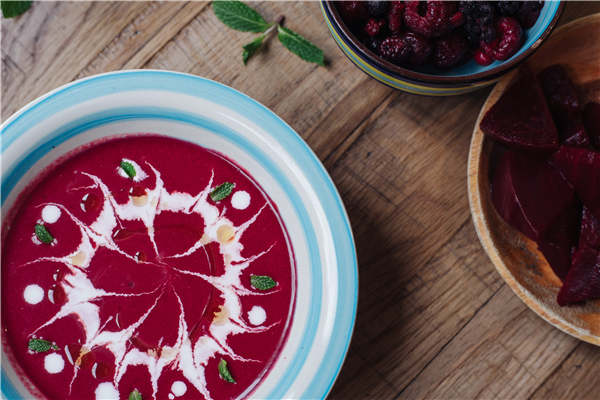 |
|
Chefs who turn plates into artworks and a dining public eager for healthier fare have found common ground in the beet. |
Health benefits
The beet, however, isn't just another pretty face.
Wellness websites such as OrganicFacts.net celebrate the root's use in treating everything from indigestion and dandruff to cancer and heart disease. Its rich payload of nutrients, vitamins and minerals has long been credited with improving blood circulation, and athletes have long been grabbing bottles of beet juice for a promised boost in stamina before competitions.
"Beets are rich in natural chemicals called nitrates," reports the website WebMD, noting that your body changes nitrates into nitric oxide in a chemical chain reaction that improves blood flow. "Most lists of 'super foods' don't include beetroot juice, but maybe they should.
"Beet juice may boost stamina to help you exercise longer, improve blood flow, and help lower blood pressure, some research shows."
"Beets contain a significant amount of carbohydrates that provides fuel for energy and prolonged sports activities," reports another site. "These are the natural building blocks of energy metabolism, and beets provide them without any of the negative side effects of many other carbohydrate-heavy foods."
Clinical trials, however, have been mixed. The beet's potential benefits prompted a recent Pennsylvania state study that tested the ability of the juice to enhance blood flow to exercising muscles.
The researchers found that the widely held belief regarding improved muscle blood flow did not hold up to their test, they reported in the journal Applied Physiology, Nutrition, and Metabolism.
Subjects were given either a placebo drink or a relatively high dose of nitrate-rich beetroot juice. They found that the latter did not enhance the natural rise in blood flow to the forearm muscles during graded handgrip exercise.
The investigators did observe a direct correlation between nitrite levels in the blood and the slowing of participants' arterial pulsation velocity, an indication that the supplement did indeed have a biological (artery de-stiffening) effect.
They speculate that the lack of a measurable blood flow boost might be due to a pool of already-strong subjects.
"Subjects were young individuals with blood pressure and cholesterol levels in the 'very healthy' range," the study leader noted. "These subjects had well-preserved vascular endothelial function to begin with."